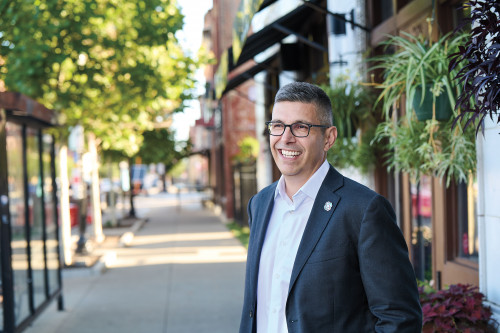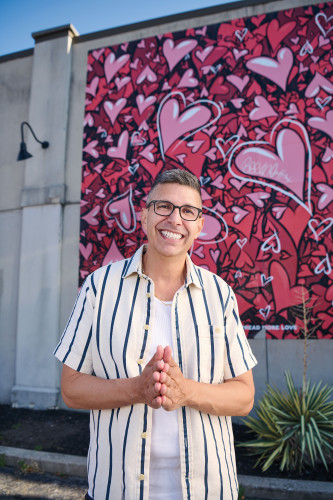There’s something about David Munar’s smile.
As the recently named CEO of Equitas Health, one of the largest LGBTQ- and HIV-serving organizations in the country, one might expect Munar, a long-term HIV survivor, to be a bit too busy for an interview. Yet the 54-year-old gay Colombian American has a welcoming, warm smile that puts one immediately at ease, like a dear friend.
Munar’s parents and sister immigrated to the United States from Colombia, settling in Queens, New York, before moving to Albuquerque soon after he was born. His childhood home was only a house away from his uncle’s. “You know how we are as Latinos,” Munar says. “We like to keep family close, to stick together so we can protect each other.”
Growing up, the only other kids around were his four cousins, all boys. “They were macho guys who liked sports. I knew I was different, and they teased me mercilessly,” Munar says. “But all I wanted was to hang out with them.” Although he didn’t have a word for it, he knew he needed to keep his difference a secret. When he graduated from high school, he moved to Chicago for college, leaving behind the protective circle of family.
“I went to undergrad at Northwestern University,” he says, “and I got really involved in the Gay Lesbian Alliance there and ended up leading the group.” Fighting for the rights of the queer community on campus awakened his passion for public advocacy and taught him the power of organization and mobilization.
After his freshman year, Munar returned to New Mexico for the summer, promising himself that if his family asked about his dating life, he wouldn’t lie. It wasn’t until his mother confronted him that he told her that he was gay. “It was a really rough summer,” he says. “My father prayed at my door every night.” His parents told him that he should not act on his impulses and needed to stay home and take care of his family; if he didn’t, they would no longer pay his tuition. “I told them that was fine, but I wasn’t going to stay with them,” he says. That fall, he returned to Chicago that fall.
After graduating with a bachelor’s degree in Hispanic Studies, Munar found fulfilling work with the American Refugee Committee, fighting for the amnesty of undocumented residents and teaching English as a second language, before landing an entry-level position at the AIDS Foundation of Chicago (AFC). “It was 1991. There were 12 people in the office,” he says. “I was the youngest member of the team and the greenest. President Clinton had just signed into law the Ryan White CARE Act. I was doing everything! I was front desk, accounts receivable, general ledger, board minutes, grant committee work, but I loved it.”
One of his early assignments at AFC was to sort through boxes of documents from the local chapter of the National Association of People with AIDS (NAPWA). “Everyone involved had passed away. Everyone. All we were left with was bankers boxes.”
One night, while taking minutes at an AFC board meeting, the switchboard at the agency started lighting up. “The phone was just ringing, ringing, ringing, and it was noticeable because it was an evening meeting,” Munar says. He was sent to find out what was causing the rush of phone calls. That night, basketball legend Magic Johnson bravely and publicly revealed that he was living with HIV. In response, frightened community members inundated AFC with panicked calls.
“So that’s how I got started. It was a huge learning experience for me,” he says.

David MunarStephen Takacs
In 1994, Munar tested positive for HIV. It was shocking, since he was in what he thought was a monogamous relationship. “I was 24. I was deeply in love. I believed this was going to be my soulmate,” he says. Munar was first diagnosed in August and retested several times hoping for a different result. By September, he started to accept that his HIV diagnosis was a reality.
First, he feared for his family; he worried about how news of his diagnosis would hurt them. “Then, my second reaction was, When I die at 35 or younger, who’s going to comfort them? And then, it was just this sense of enormous loss and enormous rejection, self-inflicted shame that I caused this by leaving the nest, by not having my clan, by not being protected by my family,” he says.
“I didn’t say anything to my partner at the time,” Munar says. “But I started to question the relationship, the honesty, trying to piece it together.”
It wasn’t until December 1, 1994, World AIDS Day, that that Munar finally told his partner when he received the positive results of another HIV re-test on his answering machine. Munar called him and disclosed the difficult diagnosis. “He felt indicted by my news and broke up with me over the phone. He completely shut down and rejected me,” Munar says. He felt confused and upset.
“I was scared,” he says. “I didn’t really know anybody that had survived HIV more than 10 years.” Munar expected to die by age 35. “And I was angry,” he says. “Angry that I might not have 10 years—it might be shorter.”
He experienced what he calls the “terror of stigma.” In those early days of the AIDS epidemic, before effective treatment, a diagnosis was not only considered a death sentence but also regarded as a moral failing. Some prominent newsmakers at the time publicly stated that AIDS was doing the country a favor by targeting gay men, minorities and transgender people.
“I was also afraid of treatment failure,” he says. “I had seen so many people who had so much incredible hope for [the early HIV treatment] AZT or something else experimental, and they did not succeed. All of those things weighed on my mind.”
Munar also witnessed the toll early protease inhibitors took on friends and clients. “I saw the way it saved the lives of so many people, but I also saw how it ravaged people physically.” Because the HIV medications were all new, the dosing hadn’t been perfected, and the side effects were miserable. Many people experienced lipodystrophy (abnormal fat distribution), gastrointestinal problems, kidney damage and more. “I didn’t understand any of it,” he says. His doctor told him that beginning treatment for HIV was like getting into a cold pool: You just have to jump in. “But I didn’t want to jump in.”
Munar tried all sorts of alternative medicines, vitamins, everything possible. “I was fighting for those 10 years,” he says. “I was fighting for my life.” In those early days of HIV treatment, it was all a gamble. “Everyone was sitting on their hands, like, It worked one month, but will it work two? Will it work three? Maybe the floor is going to fall in six months,” he says.
Munar decided he needed to further discuss treatment with his doctor. “But not this month,” he says, laughing. “I’ll do that next month. And then the next month arrived, and I thought, Hmm, maybe one more month.” It was two years before he confronted his fears and returned to his doctor.
By then Munar was experiencing health problems. His T-cell count had dipped below 200.
“There’s a period of time when I was clinically living with AIDS,” Munar says. “And I felt it. I mean, I could not cross the street without catching a cold or an upper respiratory infection.” This also led him to the not-so-irrational fears of more serious infections, like Pneumocystis pneumonia, or Kaposi sarcoma lesions forming in his lungs. He was drained and felt sick constantly sick. “It was clear that I had to move forward [with HIV medications],” he says, “and I’m glad I did.”

David MunarStephen Takacs
As he regained his health, Munar dug into his work at AFC. “I did work in case management in the ’90s, and that was really tough.” he says. “Our phone was ringing off the hook, and most of the people we were enrolling in case management, when they called us, they had nine to 18 months left to live.”
Munar moved up the ranks at AFC and remained at the organization for 23 years. His compassion and acumen earned him respect and promotions, and in 2011, he was named its CEO. In 2014, he moved on to lead Howard Brown Health, one of the nation’s largest LGBTQ organizations, as president and CEO, guiding its evolution from community health center to federally qualified health center with 11 clinics across Chicago caring for tens of thousands of patients and clients.
Munar has served on local and national boards and committees, sharing his expertise with AIDS United, the Black AIDS Institute and the Illinois Children’s Healthcare Foundation, to name a few. His career has brought him much acclaim and numerous honors. In 2010, he was inducted into the LGBT Hall of Fame, and in 2011, he was honored as a White House Champion of Change for his work fighting AIDS. In April, he left Illinois for Ohio to lead Equitas Health.
Living with HIV for 30 years is another major accomplishment. “I have more T cells than I’ve ever had in my life!” he says, “and I’m virally suppressed, which is great.” Munar says he doesn’t know any long-term HIV survivor who hasn’t experienced depression or anxiety or other challenges concerning mood and energy. “I’ve managed; I’m strong,” he says, “but I also realize that you don’t survive living with HIV for 30 years without being affected emotionally and mentally.”
His need to be true to himself—sparked by the knowledge that he couldn’t be truly authentic while in the bosom of his family—helped launch his amazing career and life. “We became infected with HIV, but we were already doubting our worth,” Munar says. “We already harbored fears that we were doing something wrong. That our identity, our choices, our relationships, our love, our sex was not the right way of doing things. The world also piled on, ‘This is your fault. You brought this onto yourself.’ But we already had that wound, and we carry that. But we have to find healing,” he says, “healing the wounds that HIV stigma amplifies.”
Family and community are never far from Munar’s mind. His parents and family still live in Albuquerque. “My family’s very accepting. They’re great,” he says. His parents are getting older, and he’s glad to say he has a loving relationship with them. “I try to get back as much as I can. My whole family lives a mile apart from each other,” he says. “Like a lot of people, I left home for identity. If I didn’t have that need, I’d probably be right there too.”
“I think that’s what we do when we leave home,” he says, “look for community, to build another family, a protective circle of people that stick together.”
Munar shares his home with a special member of his protective circle. “I have a partner, and we’ve been together for three years.” As Munar says this, he can’t help but smile.
Click here for a Spanish version of this article.







Comments
Comments